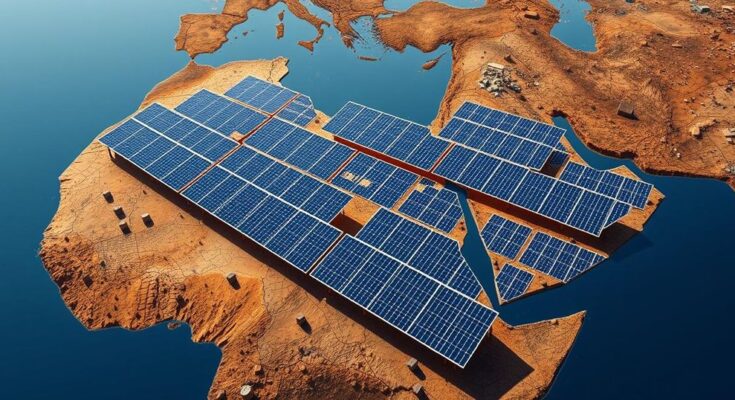Egypt has launched a solar power project in Djibouti to enhance energy independence and reduce reliance on Ethiopia, marking a strategic partnership. The project includes a solar farm with a future expansion plan, alongside technician training from Egypt. Given the historical tensions with Ethiopia, this collaboration highlights Cairo’s efforts to strengthen its influence in the Horn of Africa while Djibouti seeks to address its growing energy demands.
Egypt has strengthened its alliance with Djibouti by initiating a solar power project aimed at providing the Horn of Africa nation with alternative energy sources and mitigating its dependency on Ethiopia, which has been a regional rival for Cairo. This initiative entails constructing a solar power farm in the desolate regions of Djibouti, with plans for future expansion to a capacity of 300 kilowatts. It has been announced that Egypt will not only finance this venture but will also offer training to Djiboutian technicians responsible for its operation. The agreement was digitally formalized between Egypt’s Minister of Energy, Mahmoud Essmat, and his counterpart from Djibouti, Yonis Ali Gued, who predominantly discussed economic aspirations while sidestepping potential political ramifications related to the broader Horn of Africa context. Djibouti has confirmed that the accord pertains to the delivery and installation of solar panels in the vicinity of the village of Omar Jaggaa. “The signing on Tuesday of an agreement on the construction of a solar power plant with a capacity of 276.5 kilowatts between Djibouti and Egypt not only marks a step towards a mutually beneficial collaboration between our two countries, but also reaffirms the demands of President Ismail Omar Guelleh, who continues to make the energy issue a national priority in favour of our economic and social development,” remarked Alexis Mohamed, an adviser to President Guelleh. While the signing occurred bilaterally, observers noted the increased stakes for the Horn of Africa’s geopolitics, especially given the fraught relations between Egypt and Ethiopia over issues concerning the Nile and security ties with Somalia. Notably, Ethiopia and Djibouti maintain strong commercial links, with the former importing nearly 95 percent of its goods through Djibouti’s port and Djibouti depending on Ethiopia for over 60 percent of its electricity needs. Tensions resurfaced recently when Somalia and Ethiopia clashed over a contentious Memorandum of Understanding regarding sea access with the self-declared Somaliland, prompting Djibouti to propose a new port development to Ethiopia, which was ultimately unheeded as Ethiopia pursues its own naval base aspirations. Furthermore, a significant infrastructure development has been the completion of a 283-kilometer power transmission line and associated power station financed by the African Development Bank, enabling power supply from Ethiopia to Djibouti at a substantial investment cost of $138 million. Over the previous decade, Djibouti’s annual electricity consumption from Ethiopia has amounted to approximately 532 GWh, indicating its status as one of Ethiopia’s most notable clients for power, alongside Sudan and Kenya. Ethiopia has profited approximately $30 million yearly from its power sales to Djibouti. Currently, Djibouti foresees an increase in electricity demand attributed to rising port activities and anticipates a consumption of about 1 GWh per day by the year 2030. This escalation in energy requirements underscores its inclination towards renewable energy solutions, prompting investments in solar and geothermal initiatives. The World Bank reports that approximately 65 percent of Djibouti’s populace has electricity access, a figure projected to reach 72 percent with the successful operation of the new transmission line, and will further increase with the commencement of the solar farm.
The relationship between Egypt and Ethiopia has been historically complex, characterized by competition over the resources of the Nile River. Djibouti, situated strategically in the Horn of Africa, serves as a regional hub for trade and energy. The new solar project reflects Egypt’s strategy to strengthen its influence in the region by diversifying energy sources for its neighbors while concurrently attempting to diminish Ethiopia’s regional clout. Djibouti’s heavy reliance on Ethiopia for energy and trade enhances the dynamics of this developing arrangement. As energy needs grow, ongoing investments in renewable energy generation are becoming essential for Djibouti’s economic and social infrastructure.
In conclusion, Egypt’s new solar power initiative with Djibouti signifies a strategic move to enhance regional ties while diminishing reliance on Ethiopia. This renewable energy project not only aims to stimulate economic collaboration between the two nations but also reflects Egypt’s broader geopolitical strategy in the Horn of Africa. With increasing energy demands and the necessity for sustainable development, the partnership between Egypt and Djibouti may play a crucial role in redefining energy dynamics in the region. The situation continues to evolve, warranting close observation of the implications for Egypt, Djibouti, and Ethiopia’s relationships.
Original Source: www.theeastafrican.co.ke




